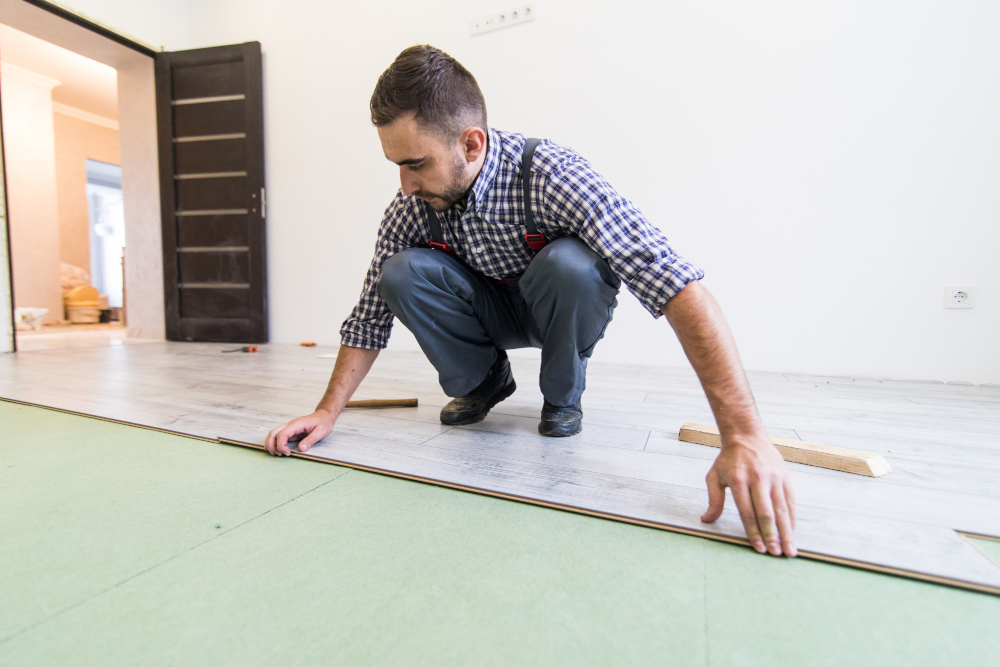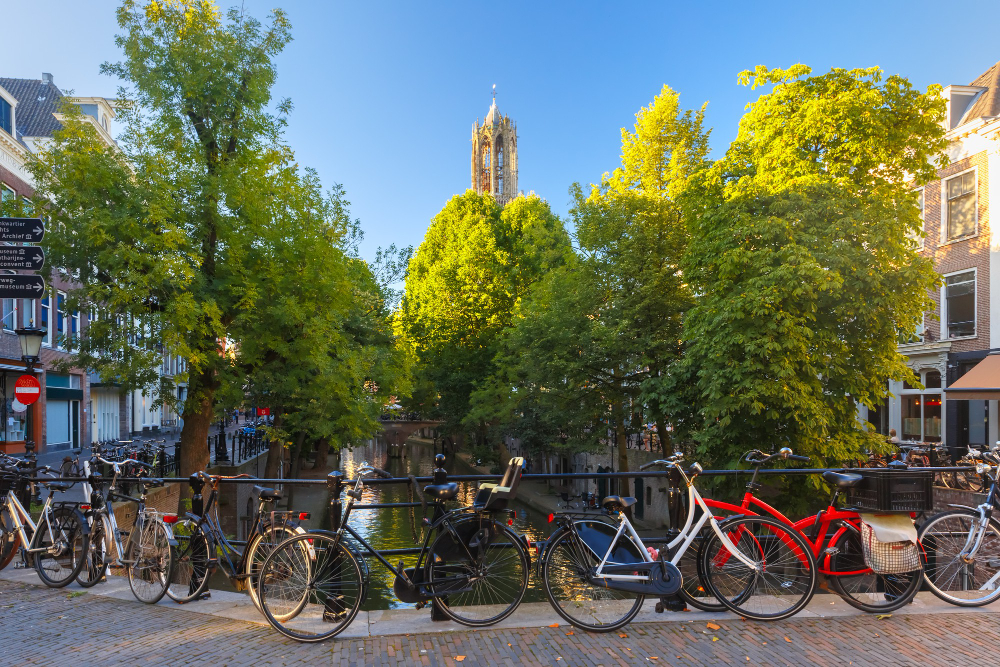There are plenty of things that will surprise you about the Netherlands — what the frick are frikandels? Why are the seagulls so violent? And is that three people on a bike!?
However, most people underestimate the surprises that are sure to face you when renting in the Netherlands.
Now, some surprises are fun to encounter in the moment, but when it comes to renting in the Netherlands, let’s just say it’s best that you approach the challenge as informed as possible.
1. A rental agency can’t charge you for their services
So, let’s take it from the top. You’ve hunted online, had multiple viewings, and now, finally, by the grace of some rental goddess, you’ve found a place to live.
You’ve signed the dotted line, paid the deposit and first month’s rent, and yet, you still have a rental agent standing in front of you with their hand open. Why? It’s the “service fee”, “key fee”, “mediation costs”, or “registration fee”, of course.

First things first, slap that hand away (metaphorically, at least.) Unfortunately, in the Netherlands, many rental agencies will try and source their commission from the tenant, citing some form of “fee” that has to be paid — but this is, say it after us, illegal.
READ MORE | 11 creative solutions to the Dutch student housing crisis that makes us say “Why didn’t we think of that?”
The agency should receive a sum of money for mediating between you and the landlord if they were hired by the landlord to advertise the property. However, this means it’s up to the landlord to pay this fee, not the tenant.
The only exception where you will have to pay fees to the agency is if you hired them to find you a property.

If an agency isn’t willing to turn to the landlord for some money or simply wants more, they may try to sneak in some “fees” for you to hand over. This is where you have the right to tell them nee, according to Dutch law, you do not have to pay such fees.
Make sure to ask the agency to specify exactly what the costs are for, and if you really want to show them you’re not messing around, it’s time to turn into Reese Witherspoon in Legally Blonde and say the following:
“As of 2015, according to Article 7:417 paragraph 1 of the Civil Code ‘BW’, it is not legal to charge me the costs for [x,y,z] when you work on behalf of the landlord.”
2. It’s very hard to significantly raise the price of rent in the Netherlands
In the Netherlands, your landlord can’t just turn around and up your rent by 20% every year — or whenever they feel like it.

While it is, of course, standard that a landlord may increase the rent from year to year (we don’t live in a utopia), Dutch landlords are only allowed to raise the rent of their properties by a certain percentage each year.
These percentages are determined by the Dutch government year and vary depending on whether or not you are renting in the private or social sector:
- As of January 2023, if you’re renting in the private sector, your landlord may raise the rent by a maximum of 4.1% per year. This number is based off the average national salary increase in 2023 (3.1%) + 1%.
- As of July 2023, if you’re renting in the social sector, your rent may only be increased by a maximum of 3.1% per year.
What does this mean? For example, if you rent an apartment in the private sector for €1,250 per month in 2022, this may be increased by a maximum of 4.1% in 2023. This means your landlord can add a maximum of €51.25 to your monthly rent for a total of €1301.25.
You should be able to find any information about the annual rent increase in your rental contract. Does the contract claim that the annual rent will be raised by more than 4.1%? According to Dutch law, you will not have to pay a penny above the 4.1%.
3. Houses in the Netherlands sometimes come without flooring
Let’s say you’ve found yourself a beautiful apartment in a stunning newbuild apartment complex — congrats! Did you know there’s a chance you’ll have no flooring?
While most apartments and buildings will, thankfully, come with the basics included, you may sometimes be left with the task of putting down the flooring. This is most commonly the case for new builds, but may also apply to older houses.

Yep, in cases like this, it’s not uncommon for a landlord to hand over the key to a completely bare apartment.
If this is a situation you really don’t want to find yourself in, make sure to look at the description of the listing and be on the hunt for the word kaal.
Meaning literally “bald,” if an apartment has ‘kaal’ in the description, it means you are likely going to have to source some of the most basic necessities — think floorboards, curtains and light fixtures — yourself.
Instead, you should opt for properties that have the description:
- “Gemeubileerde” (furnished), or
- “Gestoffeerd” (unfurnished).
4. Sometimes, the rent listed isn’t the total monthly rent
One of the main things that may surprise you when looking for an apartment in the Netherlands is that the actual monthly rent is often not listed.
What does this mean? When a property is listed on a rental site, the number you are seeing is often just the cost of the ‘basic rent’, meaning the rent without the inclusion of extra costs such as utility fees and service costs.
This is something you should factor in when considering your budget — can you cover the complete costs? Or just the basic rent?
Not sure of the total cost per month? You can expect to pay around €150 and €250 in utility costs per month. Of course, this depends on the size of the property, however.
If the price says something like “incl g/w/e” after it, then you’re in luck! This means the rent per month is already inclusive of the utility costs. Does it say “excl. g/w/e”? Then helaas, you’re going to have to factor in utility costs on top of your rent.
5. The municipality will need money from you too
Another unpleasant surprise that you may be faced with when renting in the Netherlands is that you will also have to pay the municipality for living in your rental property.
As the tenant, you will be expected to pay certain municipal taxes. For most renters, these include a waste collection and sewage tax.

These are usually paid once per year. How much you have to pay in this tax depends on a number of factors, such as the municipality you live in and how many residents there are in your home.
As of 2022, the average Dutch household was expected to pay an average of €833 in municipal taxes — yep, that’s certainly a surprise to take into consideration.
However, one tax tenants shouldn’t be expected to pay, is the Onroerende Zaakbelasting (OZB) or “real estate tax.” Since 2006, this is for the property owner, a.k.a, the landlord, to pay — not the tenants.
6. The Dutch government can give you money for rent (if you qualify)
Worrying that your income won’t be sufficient to keep up with your rental costs? Geen stress, did you know the Dutch government offers a housing subsidy?
READ MORE | Toeslagen: save money with these allowances in the Netherlands
This is known as the huurtoeslag, and it is meant to help those with lower incomes cover the cost of their rent. However, this subsidy isn’t for anyone and everyone.

There are a number of requirements that you must meet in order to be eligible for the huurtoeslag, including:
- Firstly, as of 2023, your basic rent must be no higher than €808.06
- If you are under the age of 23, your basic rent can be no more than €452.20 unless you have a child living with you (in this case, it remains at €808.06)
- You must be living in an independent living space — meaning you have your own front door that locks, your own kitchen, and your own bathroom
- You can have a maximum of €33,748 in assets
How much rental allowance you receive depends on your specific circumstances. However, by having so many requirements in place, the Dutch government ensures only those who really need it will get a housing subsidy.
If you’ve decided to opt for a €4,000 per month apartment on a salary of €4,500, then sorry, you’re not necessarily in need of a rental subsidy, just a budget (and a more affordable apartment)!
7. You can have an oral rental contract (yep!)
Not only is this surprising, but it’s also something to watch out for. Any rental agent will tell you right away that an oral contract is a less-than-ideal way to establish your rental contract, and while it’s very uncommon, it is technically legally possible.

This can be dangerous territory. You have to be careful about what you say, as this could be seen as legally binding and held against you in the future.
READ MORE | The dos and don’ts of buying a house in the Netherlands, according to the experts
If you find yourself in a situation where you believe a landlord is trying to establish a contract verbally, it’s best to just hit the pause button, grab a pen, and hand it over to them with a flourish that says, “no sir-ee, not this international.”
While it may be tempting to seal the deal then and there, it’s important to remember that by having a written contract, you have something to refer back to in the future should anything be disputed.
8. You may have to meet an income requirement
So, you’ve found your dream apartment, attended a viewing and are ready to send that bedazzled acceptance email to the agency — but hold up, your agent hits you with another hurdle “the income requirement is three times the monthly rent, do you meet this?”

Now, what on earth is an income requirement, and what does it mean for your rental dreams?
In the Netherlands, many landlords will ask that their tenants meet an income requirement in order to ensure you’re in a position to pay rent. This means that they want your monthly income to be a certain amount before they will allow you to rent their property.
The amount? This is often three or even four times the monthly rent. In practice, it would look a little something like this:
You’ve viewed a property for €1,000 per month, however, the landlord has an income requirement of three times the monthly rent. This means your monthly income should be at least €3,000 in order for the landlord to consider you.
You may be wondering whether or not the requirement concerns your gross or net income — good question! Helaas, this usually depends on the landlord.
The income requirement isn’t always stated in the initial listing of the rental, so make sure you have this in the back of your mind when attending a viewing or speaking with the agent.
9. You don’t decide how many people can live in your home
Fun fact: In the Netherlands, Dutch municipalities will actually put a limit on the number of people who can live at one address.
The result? Even if you find a two-bedroom home, that doesn’t necessarily mean that you, your partner, and your two dating friends can all live there together like you’re in an episode of Friends.

At least, you can’t all live there together while still being able to register with your municipality.
In the Netherlands, once you have found a place to live, you must register your address with your local municipality. Once you have done this, you will receive a burgerservicenummer (BSN). This identity number is very important if you want to get anything done in the Netherlands.
READ MORE | Gemeentes: what are Dutch municipalities and how do they work?
You’ll need it to apply for jobs, pay taxes, set up Dutch health insurance, and get a DigiD. This means that you’re going to be in quite a predicament if you cannot register at the address you live in because the municipality says there are too many people already registered there.
Make sure to take this into consideration when hunting for that home of yours! Plan on eventually inviting your partner to come live with you? Well then, you better ensure that it’s possible for them to register at your address as well!
10. Scams are around every corner
Unfortunately, the current Dutch housing market is a great breeding ground for scammers. There are too many people looking for housing, and too few houses. As a result, it’s easy for scammers to take advantage of desperate house-hunters.

With so many internationals looking for housing from abroad, they become the ideal targets for these scam artists. After all, you need a property upon arrival in the country, you can’t come to view it, and you probably don’t know anyone in the country who can verify its existence.
READ MORE | How to avoid getting scammed as an international in the Netherlands
As a result, your hunt for housing in the Netherlands is probably going to lead you to a few scams. Here are a few red flags you can look for:
- The landlord claims they’re not in the country, so they can’t let you view the property in person
- The pictures of the property do not look particularly Dutch/do not reveal what is outside the windows
- The property looks too good to be true — in this economy? Red flag!
- Check out the landlord’s social media, are they posting the same property all over the Netherlands or Europe? Then it’s a no-go
Moving to a new country is always going to be full of surprises — but hey, isn’t that part of the adventure?
With everything that can surprise you about renting already covered, it’s time to take the leap and look forward to the rest of the fun that you’ll encounter on your new journey.
What surprised you about renting in the Netherlands? Tell us in the comments below!
